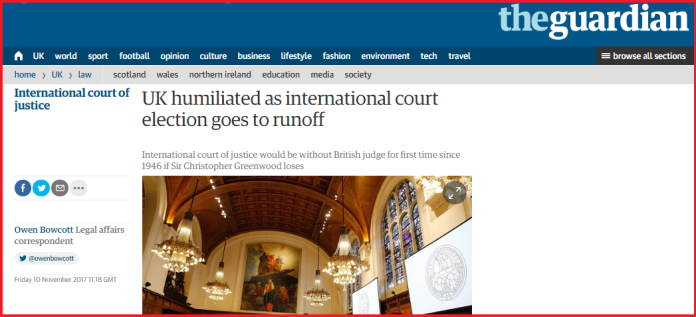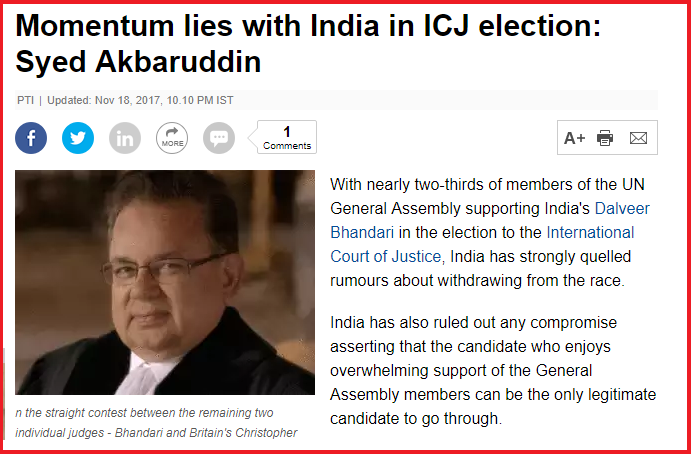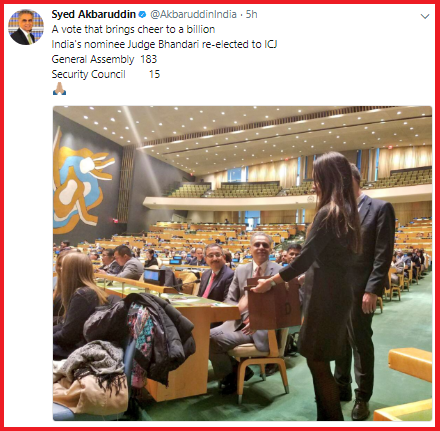India is no longer willing to let go what is rightfully hers. That’s the message with which the world walked away after a heart stopping diplomatic contest between India and Britain at the United Nations for the last open seat on the International Court of Justice.
Officially, the contest was between Britain’s Christopher Greenwood and India’s Dalveer Bhandari for election to the ICJ. Both were sitting judges of the court, with Greenwood serving since 2008 and Bhandari serving since 2012.
Five seats were open for election and four judges had already been elected, one each from Brazil, France, Lebanon and Somalia. The British press was already calling it a diplomatic humiliation for their country when the UK failed to muster support directly and was forced into a runoff election versus India.

After all, the ICJ has always had at least one British judge ever since the court was established in 1946. To be elected, a candidate must secure the confidence of both the UN General Assembly (193 members) and the Security Council (15 members). Should the two chambers disagree with each other, multiple rounds of voting are held in each house to resolve the situation.
Britain’s Christopher Greenwood held the lead in the Security Council, with 9 votes to India’s 6. But the General Assembly disagreed. And as the General Assembly voted over and over again, Bhandari’s lead grew. At last count, India had 121 votes, nearing a two-third majority in the house of 193.
But the Security Council refused to budge. Although the vote is held by secret ballot, it is widely believed that the powerful P-5 were sticking with the British judge, insistent on showing their power. After all, if India snubs Britain today, it could be any other P-5 member tomorrow. Incidentally, that’s exactly what we hope India will achieve one day.

The British in desperation pressed for an arcane mechanism of a Joint Conference to resolve the deadlock. Such a Joint Conference would have just 3 members each from the General Assembly and the Security Council. This method only exists in the rule books and has never been used before.
Also, as is wont with diplomatic intrigue, rumors were spread that India will get Bhandari to withdraw from the contest. Or that India had agreed to the Joint Conference mechanism. Both rumors were strongly denied by Syed Akbaruddin, India’s permanent representative to the UN.

The game was set for what The Times of India called possibly the “worst diplomatic showdown” between India and the UK in recent times.
And then it all happened. Here are the results of the voting in both chambers of the UN, shared by Syed Akbaruddin (Thank you sir, you are a hero!)

183 votes in the General Assembly. All 15 votes in the Security Council.
The British blinked. Greenwood withdrew from the contest. Bye, ol’ chap! Smiles all around for the Indian camp.

External Affairs Minister Sushma Swaraj tweeted out the happy news.

Thank you Madam. May there be many more such moments.
India bears nobody any ill will. But, between weakness and strength, we choose strength. Our rise is both relentless and inevitable and it must be duly acknowledged. That’s our message and we have delivered it powerfully on the world stage. Happily, our message has been accepted willingly by everyone in the community of nations.

Without missing the irony of quoting William Shakespeare over here, let me just say that All’s well that ends well.



